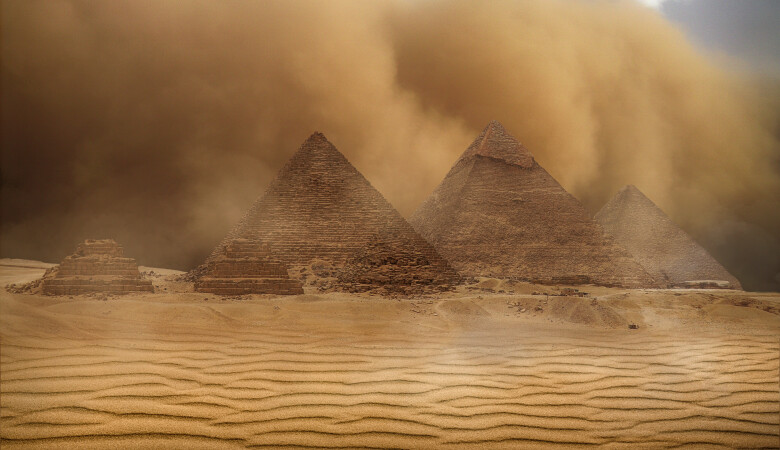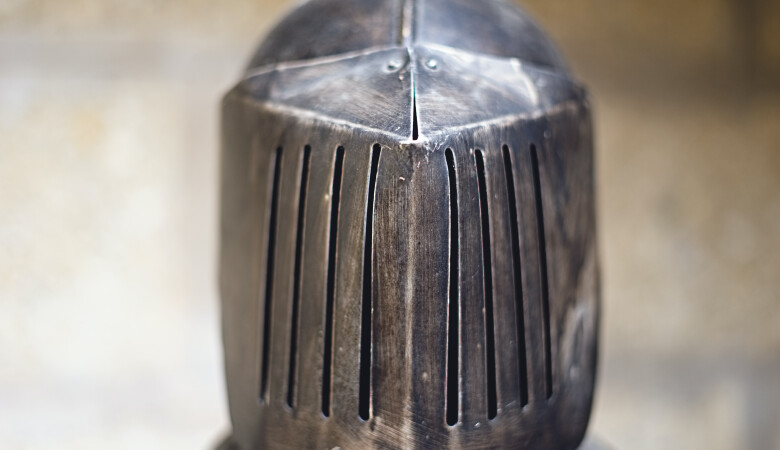The King of Babylon Thrown Down (Isaiah Sermon 14 of 80)
August 10, 2008 | Andy Davis
Isaiah 14:1-23
Judgement Day, Judgment, Prophecy
Pastor Andy Davis preaches a verse-by-verse expository sermon on Isaiah 14:1-23. The main subject of the sermon is the casting down of the spiritual power behind Babylon.
- SERMON TRANSCRIPT -
I. The Power Above Every Evil Throne
“The last of the horsemen disappeared into the smoke and the thudding of their hooves receded into the grey distance. The smoke hung on the land. It drifted across the setting sun, which lay like an open wound across the western sky. In the ringing silence that followed the battle, very, very few, pitifully few cries could be heard from the bloody, mangled wreckage on the fields. Ghostlike figures, stunned with horror, emerged from the woods, stumbled and then ran forward crying – women searching for their husbands, their brothers, their fathers, first among the dying and then amongst the dead. The flickering light by which they searched was that of their burning village, which had that afternoon officially become part of the Mongol Empire. The Mongols. From out of the wastes of Central Asia they had swept, a savage force for which the world was utterly unprepared. They swept like a wildly wielded scythe, hacking, slashing, obliterating all that lay in their path, and calling it conquest. And throughout the lands that feared them now or would come to fear them, no name inspired more terror than that of their leader, Genghis Khan.”
That’s how one writer described the aftermath of an attack by Genghis Khan and his dreaded Mongol horsemen. There’s never been a leader like Genghis Khan since that time, but many arrogant, murderous tyrants have ridden with bloody hooves across the pages of history. As a matter of fact, that really is history, the rise and fall of the world, one empire after another, of bloody, arrogant tyrants who are not satisfied with where they started but have to have more. This is the spirit of Babylon the Great that we began studying last week in Isaiah 13. It’s mentioned right to the end of history in Revelations 17 and 18. Babylon the Great is finally thrown down by the second coming of Christ. The spirit of conquering kings whose lust for blood and power, money and pleasure spurred them to plunder and pillage little villages like the one described here. But it’s a spirit driven by a deep and more wicked power than any of us can imagine. A malevolent force, the power of Satan himself, which drives them on, attacks the people of God, and seeks to oppose the kingdom of God.
Last week, we spoke of the fall of Babylon, that great city, that great empire, which crushed the world and ruined the Promised Land. This week, as we come to Isaiah 14, we’re speaking more specifically of Babylon not just generally, but of the king of Babylon. This chapter speaks specifically of the fall of the tyrant king of Babylon. And while it may refer initially to a specific man in history, I believe it refers to all tyrants in history, all of them. Some theologians think it may speak of nothing more than a single king, perhaps Nebuchadnezzar himself. Others think it doesn’t refer to a human king at all but actually refers to Satan. They point to the soaring language of Isaiah 14. For example, verse 12 says, “How you have fallen from heaven, O morning star, son of the dawn!” The King James version gives us “Lucifer, Lucifer.” Many ancient scholars believed that these verses spoke of the fall of Satan before time began.
For myself, I think it speaks of both of these things. I think it speaks at the human level of human tyrants, of kings whose ambition soared above their present circumstances to the point where they actually wanted to be worshipped like gods. Their ambition drove them on, like Genghis Khan and others, to trample defenseless people. But I think it also speaks of the power behind the throne, of Satan as well. And that partnership with Satan, his demonic influence over kings, will continue to the end of time, right through to the time of the antichrist when Christ comes and destroys them both by the splendor of His coming and the establishment of His kingdom forever. That’s what I think is the story of Isaiah 14.
So for two weeks, we are going to look at this section of scripture. This week we’re going to focus on the human side. We’re going to talk about the human kings of Babylon, what they have done, and what God promises for them. Next week, we’re going to focus more specifically on Satan, his fall, his ambition, what motivates him, and to the final union between Satan and the antichrist. We’re going to look at the power of every evil throne. The tyrant king of Babylon, we’re going to look behind it. The power behind every evil throne is Satan. But the real story of this chapter is the power above every evil throne and that is God Himself. To God we look, to the sovereign King of the Universe. We can look the tyrant king in the face and be unafraid. We can testify to him of the saving love of Jesus Christ even though he kills us as he killed perhaps our brothers and sisters before us. We can be unafraid of his power because we know there’s a king who holds him in the palm of His hand.
II. God’s Purpose: the Eternal Joy of His Chosen People
Despite Israel’s Sin, Chosen Still
Now, right at the beginning of Isaiah 14, we see God’s eternal purpose, which is the eternal joy, comfort and security of His chosen people. That’s what God is doing through all of this. Despite Israel’s sin, Israel is chosen still. It says in Romans 11:29, “God’s gift and his call are irrevocable.” Soon after Isaiah’s time, Israel would be sold to Gentile powers. During Isaiah’s time, the Northern Kingdom was sold to the Assyrians. Approximately one hundred and fifty years later, the Southern Kingdom of Judah was sold to the Babylonians. But Isaiah promises here that God will again have compassion on His people and He will choose them again. Look at verse 1, “Once again, he will choose Israel and will settle them in their own land.”
I believe more than mere restoration is promised here. When the Jews came back to the Promised Land, 42,000 of them, under Cyrus the Great of Persia, they were still under Gentile domination. They had to ask permission for everything. Ezra and Nehemiah had to stand in front of a Gentile king and ask permission. So it has continued throughout the centuries. Jesus calls this the Times of the Gentiles, when Gentile power and influence rules, at least in part, over the Promised Land. But here Isaiah is promising a complete reversal, in which the chosen people will dwell in a position of authority over their former captors. Look at verse 2, “The house of Israel will possess the nations as menservants and maidservants in the Lord’s land. They will make captives of their captors and rule over their oppressors.” This, I believe, does not receive its ultimate fulfillment until the end of time, when the righteous will rule over the judgment of the wicked.
Aliens Joining Israel
As the Apostle Paul says, “Do you not know that the saints who will judge angels will also judge the world?” (1 Col 6) In the millennial kingdom and even more in the internal state, this concept will have its fulfillment. Verse 1, “Once again he will choose Israel and will settle them in their own land.” God promised to Abraham a land. He made him a promise. It says in Hebrews 11 that Abraham died without receiving the promise. God doesn’t break promises. However, the land they are going to get will be eternal. It will be the new heaven and the new earth, and they will inherit the earth as Jesus promised. That’s the future, ultimately, of all this. And it says that aliens are going to join Israel. Again, in verse 1, “Aliens will join them and unite with the house of Jacob.” That’s even better for us because we are Gentiles. We’re not biologically descended from Abraham. We are not children of Abraham. But this is in direct fulfillment of the promise that God made to Abraham when he was called out of Ur of the Chaldeans.
Back in Genesis 12:2-3, it says, “I will make you into a great nation and I will bless you; I will make your name great, and you will be a blessing. I will bless those who bless you, and whoever curses you I will curse; and all the peoples on earth will be blessed through you.” So we, Gentiles, have hope in being included in the promises that God makes to the Jews. This is repeatedly predicted in Isaiah. The fact is that representatives from the nations are actually going to be joining together with the Jews under the covenant promises, worshipping the one true God. I believe this is ultimately fulfilled in the spread of the Gospel to the ends of the earth. The apostle Paul says, in Romans 11, that we, like wild olive shoots, have been cut out of an olive tree that’s wild by nature and been grafted into a cultivated olive tree. We look to Abraham, our father in faith now, and we draw nourishing sap from that root system of the patriarchs, the Jews.
God’s Purpose: Bringing Joy to His People in Every Land
So God’s ultimate purpose, then, is to bring Jew and Gentile together under the head of Jesus Christ, blessed forever and joyful forever. We will be free forever from concern about the arrogant tyrant who would strike us down and make us miserable. Look at the joy, look at the peace, look at the relief that just flows through this passage. It’s really quite striking, isn’t it? Look at verse 3, “On the day the Lord gives you relief from suffering and turmoil and cruel bondage.” And in verse 7, “All the lands are at rest and at peace; they break into singing.” Celebration! God throws down the king of Babylon so that He can bring joy and relief and security to His chosen people all over the world.
III. The “King of Babylon” Thrown Down
A Taunt Song Over the Fallen Tyrant
We come to this taunt song. That’s what it’s called. It’s a taunt song where the oppressed people are free forever from the tyrant, and they break forth in singing. They just celebrate. They can’t hold back. When I was growing up, every year we watched the movie “The Wizard of Oz.” Do you remember that movie? Remember when Dorothy’s house falls on the Wicked Witch of the East? The Munchkins come out and discover that she’s dead. Do you remember what they do? They start singing, “Ding dong the witch is dead!” I can hardly even mention that here from the pulpit, but it just seems so perfect. That’s exactly what happens. The oppressor is dead and they’re chanting and singing. They’re celebrating, all the little Munchkins. I thought, “Do I really want images of Munchkins dancing in your minds?” But there it is. They’re celebrating. They’re happy that the tyrant is gone, until of course, the Wicked Witch of the West shows up. Meet the new tyrant, same as the old tyrant.
So it has been and so it will be until the antichrist is thrown down by the second coming of Christ. We can look forward to that. There are pockets of relief. There are pockets of celebration that happen. But it’s not until Babylon the Great itself is thrown down, and the final king of Babylon is thrown down, and the wicked malevolent force, Satan, is thrown into the lake of fire, that we will at last celebrate like this. It’s coming friends, and oh, what a shout of joy there will be! What singing we will do when we realize that the one who oppressed us, who tempted us, who attacked us every step of the way, who sought to pull us from Christ at every moment, is gone forever and we’ll never have to deal with him again! Oh, how sweet will that song be! So it’s a time of celebration. It’s a song. Verse 4 says, “You will take up this taunt against the king of Babylon.”
Let’s talk about this idea of the King of Babylon. I don’t believe any one specific human king is intended here. Some people think it’s referring to Nebuchadnezzar. I have to tell you, honestly, I hope that Nebuchadnezzar is a brother in Christ. I hope that we will have fellowship together in heaven. I have better hopes than this for Nebuchadnezzar. Let me tell you, I have my predispositions and I’m rooting against this being Nebuchadnezzar. I think God converted him. I really do. If you look at verse 5, I think there’s an indication right in the text that we’re not speaking of any one single ruler, because it speaks of the scepter, the rod of the wicked. Verse 5 says, “The Lord has broken the rod of the wicked, the scepter of the rulers.” Do you see the plural there? It’s not just one ruler He has in mind. It’s whoever takes up the fallen scepter and then runs with it for a while. One tyrant after another, it’s not just one. So I don’t think it’s Nebuchadnezzar, okay? Are you satisfied? If you think it’s Nebuchadnezzar, come and talk, and we’ll find out. But I think you should be hoping, like I am, that he actually was converted.
There’s also no indication that any of this stuff ever happened to Nebuchadnezzar. It seems like he died relatively peacefully and passed his kingdom on to his son, Amul-Marduk. His son passed it on to his son, Belshazzar. We know Belshazzar from Daniel chapter 5. He was there at the fall of Babylon, and he seems like a weak, soft partier to me. He liked the soft life, the comfortable life, the luxurious life. He liked to eat and drink and be merry. There’s no record of him doing any of the kind of crushing oppression that’s spoken of here, though he does die a painful death under the judgment of God. Yet I don’t think this is referring to him. Therefore, I think it’s best to see the human side of this prophecy as referring to the king of Babylon, a representative of the spirit of Babylon, who takes up that tyrannical rod and carries it for a while and smashes the earth with it until his time comes. The people are breaking out in a taunt song against the fallen tyrant. They’re celebrating the end of his tyranny. They’re celebrating his judgment under the wrath of God. They’re celebrating the freedom that the whole world experiences now that he’s dead. That’s what is going on here.
Victims of overpowering tyrants are noteworthy. There’s the sense of powerlessness and helplessness that they face. They can do one of two things. If you’re living Germany in 1939 or 1941, and you don’t like what Hitler is doing to the Jews, you have two choices. You can speak up, defy Hitler, and die. It’s suicide and you know it. Or you can quietly, almost in a cowardly sort of way, say nothing. You can pray, hide, hunker down, and wait. Those are your choices. I don’t know if there are any other choices when that kind of tyranny and that kind of power is opposing you. When the victims are alone, they cry out to God for deliverance. Psalm 94:2 says, “Rise up, O judge of the earth; pay back to the proud what they deserve.” Let vengeance come. They’re crying aloud for vengeance. It happens even after their deaths in Revelations 6:10, “[The martyrs] cried out in a loud voice, ‘How long, sovereign Lord, holy and true, until you judge the inhabitants of the earth and avenge our blood?’“ They are told to wait a little while longer, until the full number of the martyrs comes in. They’re crying out for God to be their deliverer because there’s nothing else they can do. They’re powerless to stop the tyrant.
The Vicious Oppression is Over
In the flow of history, death or conquest by another nation is what ends tyranny. It’s not the weak and oppressed that rise up. The ruler dies or some other worse tyrant comes along and topples him from power. That’s how it goes. But there will come a time when tyranny itself will die. The spirit of Babylon will be gone forever and oh, how we long for that day! The vicious oppression will be over. Look at verses 4 through 6, “How the oppressor has come to an end! How his fury has ended! The Lord has broken the rod of the wicked, the scepter of the rulers, which in anger struck down peoples with unceasing blows, and in fury subdued the nations with relentless aggression.” We see the viciousness of the reign of tyranny described here. The rage of the tyrant has finally come to an end.
These self-worshipping tyrants are noteworthy for their rage and their anger. They generally fly into a rage when anyone won’t bow down to them and worship them in some way, or when anyone brings them some bad news that they don’t want to hear. We have Nebuchadnezzar himself, before God dealt with him in chapter 4 of Daniel. In chapter 3, he sets up a statue, 90 feet high and 9 feet wide, made out of gold from top to bottom. I’ve wondered before if he made it out of gold because he didn’t like the statue in chapter 2, which was only a head of gold. He’s like, “Alright, why don’t we have the whole statue out of gold? Maybe I can continue forever.” But he can’t.
He’s going to make Shadrach, Meshach, Abednego, and the whole nation bow down to him and his power. Well, Shadrach, Meshach, and Abednego won’t do it. They bring these three young Jewish men in, and Nebuchadnezzar deals with them very directly. He commands them to bow down or he’s going to throw them into the fiery furnace. They refuse to do it. Very courageously, they refuse. When they make their answer, Nebuchadnezzar flies into a rage. He just goes insane. Angry with them, he orders the furnace heated to seven times hotter than usual. It’s the wrong thing to do! If you really want to make them suffer, you need to cool it off so that it takes hours and hours for them to die. But he’s just not thinking clearly. He is so enraged that anyone would oppose him. That’s the spirt of tyranny. It’s not just him.
Hitler was known for his rage, his temper tantrums. Even the highest officials in his regime were afraid to come and bring him bad news. Hermann Goring, who was a vicious man, used to tremble before coming and bringing bad news to Hitler. He said that Hitler had a purple vein that came across his nose and up to his forehead and it would pulsate, almost like it was fit to burst. And he needed medications after these spells of rage would come over him. Then there was Joseph Stalin, who was making plans in 1953 to exterminate the Jews, much as Hitler had. When the plans started to run afoul, as they tend to do when it comes to the Jews (because God sovereignly ordains that they will not be exterminated), Stalin flies into a rage. In March of 1953, he goes into an apoplectic rage. His rage reaches a crescendo. He drops to the floor and he’s dead the next day. His own rage killed him! But in Isaiah 14, it says that, “The rage of the tyrant has finally come to an end.” We don’t need to face it any more. It’s gone forever because God’s not impressed. He’s not intimidated and He will deal with it in His own time.
The tyrant uses his overwhelming power to crush all opposition. Military power, I mean. Isaiah 14 says again in verses 5 and 6, “The Lord has broken the rod of the wicked, the scepter of the rulers, which in anger struck down peoples with unceasing blows, and in fury subdued nations with relentless aggression.” It’s what they do. It’s the tramp of the Roman legions, for centuries, through the towns and villages of Europe and Palestine. It’s the sound of Atilla the Hun’s thundering cavalry coming across and bringing waste and destruction, even to the growing church in western Europe. It’s the terrifying sound of Viking longboats coming through the morning mist, landing on the pebbled shores of Lindisfarne and other monastic islands. The Vikings come with bloodthirsty rage. They won’t spare anyone. Not defenseless monks, not women, not children. They’re going to plunder. They’re going to rape. They’re going to pillage. It’s what they do.
Of course, it’s the rhythmic, hob-nailed boot march of the Nazis, goose-stepping through the time of their ascendancy, 1939, 40,41, when it seemed they could never lose a battle and no one could ever oppose them. It’s the sound of the Gestapo coming up the stairs in the middle of the night and banging on the door, taking away defenseless people: Jews, Christians, and anyone that opposed them, hauling them off. They are never seen again. They die, gassed in concentration camps. It’s the mindless savagery of the Soviet Union’s anti-Christian crusade. Twenty million Christians were put in gulags and systematically tortured and executed under Stalin. It’s the sound of an enraged mob in China, during the Cultural Revolution, screaming insults at the house-church pastors as they’re marched down the streets with their crime written on placards around their necks. If anyone won’t join in and chant at them, they’re noted by the secret police and they’re arrested as well. It’s tyranny. It’s the rod of tyranny, smashing people with relentless blows. At the end of time, it’s going to reach a crescendo under the blood-thirsty reign of the antichrist, as he dominates the entire world and executes anyone who will not receive the mark of the beast and worship him as God.
Peace Results All Over the Earth
The terror of the powerful tyrant will be broken. When Christ comes again, He will put an end to tyranny forever and He will reign as a glorious king. At that time, peace will reign all over the earth. Look at verse 7, “All the lands are at rest and at peace; they break into singing.” This peace brings indescribable joy. I believe that the joy of that peace is directly proportioned to the power of the tyrant and to his viciousness. The more powerful and vicious the tyrant, the greater the joy when he’s thrown off. You have, on the cover of your bulletin, a picture of VE Day. I think those are British people gathering together in Trafalgar Square on March 8, 1945. They’ve heard that Hitler is dead. He put a bullet through his brain in a Berlin bunker before the Russians could get him. They are celebrating. It’s a wild celebration. From what I heard, it was incredible. I wasn’t there, too young for that, but I heard it was just amazing. Total strangers were dancing, hugging, and kissing each other. They never see each other again. There is just amazing joy and celebration because the tyranny has finally come to an end.
I think in our lifetime, perhaps we saw it with the fall of the Berlin Wall in 1987. That November, finally East and West Berlin came together as one city, and communism was exposed as the economic and social fraud that it is. Finally, it came to an end there. What joy there was and what celebration! Everybody wanted to get a hammer and go bang on that wall a little bit and pull it down.
Destruction of the Earth Has Ended
The destruction of the earth will end. Look at verse 8, “Even the pine trees and the cedars of Lebanon exult over you and say, ‘Now that you have been laid low, no woodsman comes to cut us down.’” One of the things about tyrants is that they think the earth is theirs to plunder. They can do anything they want with the natural resources of the earth. Gold, silver, oil, iron, and anything coming out of the earth, they strip mine. They do whatever it takes to fuel the engines of industry, to keep it going.
It says in Deuteronomy 20:19, speaking to the Jews, “When you lay siege to a city for a long time, fighting against it to capture it, do not destroy its trees by putting an ax to them, because you can eat their fruit. Do not cut them down. Are the trees of the field people, that you should besiege them?” It’s an interesting passage, Deuteronomy 20:19. Don’t do it. Don’t tear down all the trees. The earth was given to us as a stewardship. We are to care for it. Genesis 2:15 says, “The Lord God put Adam in the Garden to serve it and protect it.” That’s my translation of those two Hebrew words. I think it’s a fair one. To serve the Garden and enable it to be everything it could be, to come to full fruition and protect it from harm. Not to pillage it and rape it and plunder it. It says in Revelation 11:18, “The time has come… for destroying those who destroy the earth.” These tyrants, they do it better than anyone.
IV. No Tyrant Stronger Than Death
Powerful Tyrant Weak in the Face of Death
We’ve seen the wickedness of the tyrants. We’ve seen their great power. But one thing we’ve noted throughout history: there is no tyrant stronger than death. There is no tyrant stronger than death. Look at verses 9 through 11. We see here the powerful tyrant, weak at last in the face of death. Verses 9 through 11 say, “The grave below is all astir to meet you at your coming; it rouses the spirits of the departed to greet you – all those who are leader in the world; it makes them rise from their thrones – all those who were kings over the nations. They will all respond, they will say to you, ‘You also have become weak, as we are; you have become like us.’ All your pomp has been brought down to the grave, along with the noise of your harps; maggots are spread out beneath you and worms cover you.” This is a remarkable passage of prophecy here.
Here the dead kings, as if in some nether region, notice that this powerful tyrant king has come down and they’re almost acting surprised. But there’s a bit of mockery here. They are saying, “Oh look, I guess you weren’t any stronger than we were. Here we are dead and here you are dead.” Now this is just poetical. I don’t think we should take a theology of the afterlife from this passage, any more than we should imagine that trees will be able to speak from verse 8. Rather, this is poetical language saying that even the most powerful tyrant can’t stand firm in the face of death. It is God’s judgment on the human race. There’s nothing they can do to stop it. The grave is personified here and the mighty potentate has his power stripped forever. Death has stripped him of it.
The Final Fate of the King of Babylon… Moldering, Dead in the Street (vs 18-21)
Picture, then, a Babylonian king, drunk, lying in his bed. The Medes are running through the palace looking for him. They find him and they kill him that very night, Daniel chapter 5. Or picture a Roman Caesar coming out after a good time in the Coliseum, surrounded by his usually faithful Praetorian Guards. But there’s a plot afoot. He doesn’t know it. One of them plunges a dagger between his ribs and he dies. His cousin becomes the new Emperor of Rome. Or picture a Russian Tsar wheezing and gasping as he chokes out his last few breaths and dies of consumption. Or a Chinese communist dictator, whose legacy is still with us, lying helpless in his bed, stricken with a heart attack. He rises up a little, tries to speak, and can’t do it. He gurgles something and slumps back down on the bead. Then he’s dead. Where’s your power now? Where has it all gone to? They are the very picture of weakness now. That’s what’s going on here in Isaiah 14. His pompous luxury is stripped as well. Not that you’d want to, but go look at him in two or three weeks. There will be maggots and worms, just like everybody. You can’t take it with you. You can’t take the noise of the harps. You can’t take the luxurious, purple silk robes. It’s all gone. It’s all going down into the grave.
So the final fall of the king of Babylon is that he will molder, dead in the streets. Look at verses 18 through 21, “All the kings of the nations lie in state, each in his own tomb. But you are cast out of your tomb like a rejected branch; you are covered with the slain, with those pierced by the sword, those who descend to the stones of the pit. Like a corpse trampled underfoot, you will not join them in burial, for you have destroyed your land and killed your people. The offspring of the wicked will never be mentioned again. Prepare a place to slaughter his sons for the sins of their forefathers; they are not to rise to inherit the land and cover the earth with their cities.” Ordinarily, kings are honored in death. Presidents lie in state in the rotunda. People pass by. It’s a solemn time, a time of reverence and honor. Ordinarily, that’s what happens. But this king doesn’t get that. He doesn’t get a state burial. He’s thrown out like refuse in the streets. Like a branch stripped from the tree and lying on the ground, his body is trampled underfoot.
I get the picture of Ahas, whose blood was licked up by dogs. And of course, Jezebel, you couldn’t even find a piece left of her. Something like that. Or like Hitler’s body, which I think was doused with gasoline and then burned, lest the Russians should desecrate it. But even worse than what happens to this king’s body, this king would have no legacy. His offspring, it says, would be cut off entirely. All memory of his name effaced forever. His kingdom is over. It’s ended forever. He’s got no legacy. He’s done. He’s thrown out. And why? Verse 20 says, “For you have destroyed your land and killed your people.” It’s interesting, that’s what he does to his own people. You have to wonder what the Germans thought of Hitler in June of 1945, when the whole country was a pile of rubble from one side to the other. Did they love him then? Did they honor him then? He was the one who did that to their country, ultimately, because of his policies and his leadership.
Some have said, I think somewhat wisely, that people get the leadership they deserve. That’s meant negatively. It’s not like a good people get a good king, something like that. But, if a nation will tolerate a leader, then that could be the outcome. Here, it is turned around because of what he did to his people, because the people were destroyed, the people he should have protected and cared for and served, like any good leader. Because of that, he’s judged.
The Final Fall of Babylon (vs 22-23)
And so we also have the final fall of Babylon in verses 22-23. Here again, as we saw in chapter 13, God is doing all of this. None of this is an accident. It’s not just happened. This is something God has done to judge this man. “’I will rise up against them,’ declares the Lord Almighty. ‘I will cut off from Babylon her name and survivors, her offspring and descendants,’ declares the Lord. ‘I will turn her into a place for owls and into swampland; I will sweep her with the broom of destruction,’ declares the Lord Almighty.” We’ve already seen in Isaiah 13 that Babylon will never be inhabited again.
V. The Reason for Judgment: Pride
What is God’s motivation in all of this? What’s the reason for the judgment? Well, it comes down to one word, pride. God hates human pride. He hates it with a passion. God opposes the proud. This is a chapter of God opposing the proud. This is how much He hates pride. The pride is right there in these famous verses right in the middle, verses 12-15. “How you have fallen from heaven, O morning star, son of the dawn! You have been cast down to earth, you who once laid low the nations! You said in your heart, ‘I will ascend to heaven; I will raise my throne above the stars of God; I will sit enthroned on the mount of assembly; on the utmost heights of the sacred mountain. I will ascend above the tops of the clouds; I will make myself like the Most High.’ But you are brought down to the grave, to the depths of the pit.” It’s all about ambition. It’s about soaring ambition.
The king of Babylon looks at himself and sees more there than he realized, up to this point. He’s got potential. God has put him in a bounded place. There are boundaries around him like there are around all of us. God sets those boundary lines up. David says, in Psalm 16:6, “The boundary lines have fallen for me in pleasant places; surely I have a delightful inheritance.” God sets those boundaries up. But this tyrant, he’s not satisfied with it, just like Satan wasn’t satisfied with his boundaries. So he starts to move out, to expand his boundaries, to jump across borders and boundaries, and to make an empire for himself. Ultimately, it’s going to include, in his own heart, raising his throne above the stars of God and sitting enthroned on the mount of the assembly where God sits. Yes, he’s going to want to be worshipped.
How many human kings has this been true of? In the book of Acts, King Herod stands before the people with shining, radiant robes, and he gives a little speech. The people say, “This is the voice of a god and not of a man.” And he actually likes it. He’s like, “Well, finally, you see it!” The voice of a god and not of a man. Immediately, he was stuck down by worms, just like here in Isaiah 14, and died. The Roman Caesars also saw themselves as deities. The root of it all is Satan’s soaring ambition, which we’ll see next week. It’s really Satan that’s feeding this pride, putting logs on the fire. He’s feeding it until both are destroyed together forever. Because God opposes the proud but gives grace to the humble.
VI. Application
Understand the Future Fate of All Godless Dictators
Next week, we’re going to talk more about Satan’s activities, Satan’s ambitions. As we come to the end of the human section in understanding this, what application can we take? Well, first, understand the future fate of all tyrants. Isaiah 14 stands over all tyrants, and we have some today. There actually is a website, parade.com, which lists the top 15 tyrants on earth today. It’s really amazing to read thumbnail sketches of each of these folks. For example, Omar al-Bashir, of the Sudan. He’s the worst dictator on earth, so this website says, because of his ongoing deadly human rights abuses in the Darfur region of the Sudan. Over the last four years, at least 200,000 people have been killed by his forces nationwide. 5.3 million have been driven from their homes, and more than 700,000 have fled from the country. There’s Kim Jong-il of North Korea, who has isolated his nation from the rest of the nations on earth. His record of human rights abuses is every bit as bad.
Recently, we have been following Robert Mugabe of Zimbabwe, an unbelievable tyrant. He’s not as powerful as some of the others, but he has ruined his country. The inflation rate there was 1,281% last month. 1,281% inflation rate. In 2002, he permitted an election. But in the middle of the election, the guy who was running against him was arrested for treason. So when there was an election earlier this year, the guy who was running against him decided to drop out of the race. You may think that’s probably a wise decision. That’s Robert Mugabe. He’s a tyrant. It goes on and on. It’s not just those three. There are many, many others. All of these dictators will suffer the same fate. They will all be judged, as in Isaiah 14, unless they repent and come to faith in Christ. And let me speak about that for just a moment.
Pray for Rulers to be Saved
Should we pray for a tyrant to be saved? Is it possible that the grace of God can reach into the megalomania of a tyrant like this and actually save him? That’s why I mentioned Nebuchadnezzar. I think He can. I think that Nebuchadnezzar and Saul of Tarsus stand as trophies of God’s grace, of what God can do to anyone, anytime, if He moves out with His grace. The Apostle Paul puts it very, very plainly in 1 Timothy 1:15-16. “Here is a trustworthy saying that deserves full acceptance: Christ Jesus came into the world to save sinners – of whom I am the worst. But for that very reason I was show mercy so that in me, the worst of sinners, Christ Jesus might display his unlimited patience as an example for those who would believe on him and receive eternal life.” You may have come in here today thinking you’re the worst of sinners. That’s what Saul of Tarsus thought about himself. “I’m the worst. Nobody could ever forgive me for what I’ve done to the Christians. God couldn’t forgive me.” But God did forgive him! Such is the grace of God. Where sin abounds, grace abounds all the more. There is no human tyrant whose sin is so great that the grace of Christ cannot cover it.
Paul goes on in 1 Timothy 2:1-2 to advise us to pray for rulers and leaders. This is what he says, “I urge, then, first of all, that requests for prayers, intercession and thanksgiving be made for everyone – for kings and all those in authority, that we may live peaceful and quiet lives in all godliness and holiness. This is good, and pleases God, our savior.” The first reason is so that the people of God can have peace and security in their lifetimes and do the work of the Kingdom. But there’s a second reason. “This is good and pleases God, our savior, who wants all men to be saved and come to a knowledge of the truth.” Can God save an Osama Bin Laden? Can He save an 82-year-old Robert Mugabe at the end of his life? Can He do that? We’re commanded to pray for it. I think there’s not going to be many of them saved. But that there’s one at all shows that they can be. We’re commanded here to pray.
Come to Christ
For you individually, as you’ve come here today, perhaps you feel guilty. Perhaps you feel alienated from God. You don’t know what you can do about your guilt. The cross of Jesus Christ is an ocean of grace. It can cleanse any stain. Come to Christ. Trust in Him, look to Him who shed His blood for you. His grace is the story of history, not these tyrants, bloodshed and tyranny. It’s Christ’s grace.
Hate Pride and Humble Yourself
Finally, for myself, I think it’s safest to see similarities between myself and the tyrant here. Now, I’m not this kind of man, but I have pride like this. My pride is the worst enemy of my soul. It makes me think I don’t need to listen to a sermon like this. It makes me think I don’t need to be rebuked or convicted about this or that and beyond that. It makes me think I don’t need Jesus as much as I really do. My pride makes me angry towards people that I love, that are close to me, or towards total strangers who cross me and take something I wanted. My pride is my worst enemy. To see it described here, whether it’s Satan or the king of Babylon, I feel a similar elevation in my heart, saying, “Do you know who I am?” All of us have that. It’s part of the human race, part of our sin condition. Flee from it. Ask God to humble you. Humble yourself under God’s mighty hand. In due time, He will lift you up. Join with me in prayer.































